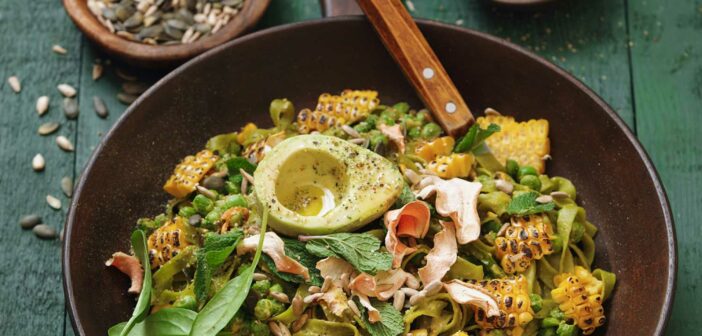Why a plant-based diet—even for one day a week—could boost your health in 2022 and beyond
By Karen Hendricks
People are passionate about food. Some of us love—or loathe—steak. Just saying the word “vegetables” makes some people cringe, while others adore their “veggies.” Mentioning broccoli or Brussels sprouts can light up your eyes … or trigger some serious eye rolling.
Whether you’re in one camp or the other, or somewhere in the middle, there are takeaways everyone can glean from Adams County’s health and wellness experts. If you’ve ever considered embracing a plant-based, vegetarian, or vegan lifestyle, becoming pescatarian, or the now-trending flexitarian, we’ve got you covered. We explain the healthy benefits of a primarily plant-based diet—whether it’s something you try once a week or implement every day of your life. And it’s not all about you. Planting these seeds of dietary wisdom could grow into real environmental impacts for the world around us.
Define Your Terms
First, let’s start with some basic definitions. Here’s how Gattu Rao, M.D., of WellSpan Family Medicine, Hanover, breaks it down:
A vegetarian does not eat meat.
A vegan does not eat anything that comes from an animal (meat, eggs, or dairy products).
Born and raised vegetarian, Dr. Rao says her conversations about plant-based eating tend to be “easy and free-flowing” because the concept fits into patients’ overall lifestyle, nutrition, and exercise habits.
First, Find Your Why
Chelsea Schonhaut of Gettysburg has dabbled in many different diets.
“I’m currently eating meat, but I’ve been on-again, off-again vegetarian and vegan since I was 13 years old,” says Schonhaut, now 30.
“It started when I was a teenager, purely from a moral standpoint,” she explains. “I have a lot of trouble with eating animals and cruelty to animals. When I was a teen, I wasn’t concerned with the health aspects, but as I got older, I started learning more about the environmental impact of the meat industry and the health benefits of having sustained periods of plant-based diets.”
During her longest period of vegetarianism—paired with consistent exercise—she lost about 50 pounds. Now, she cycles in and out of vegetarian, vegan, and meat-eating periods, something that’s now become known as “flexitarian.”
“In any given month, I spend one week on a vegetarian diet just because it makes me feel better about my environmental impact on the world, and it makes me feel better physically,” Schonhaut says.
She’s identified many of the top reasons people seek plant-based lifestyles: improved health and wellness, moral motivations, and environmental factors.
Noticing how different foods make you feel is a common first step.
“I was having digestion issues; meat just didn’t agree with me,” says Teri Kuharski, 70, of Gettysburg.
For about a dozen years, she’s been primarily pescatarian—meaning, instead of meat, she eats fish and seafood.
“Light and energized” is how Kuharski describes feeling since she eliminated meat from her diet.
Two cookbooks were extremely helpful to Kuharski’s transition. “Diet for a Small Planet was my bible for a while,” she says, “And the Oh She Glows cookbook is just fabulous—it’s the bomb.”
Gradually reducing the amount of meat in your diet is what Kuharski recommends to those thinking about going vegetarian. It rings true with sound medical advice.
Baby Steps
“I really want people to know that: A, going vegetarian or vegan is feasible, and B, it takes baby steps,” says Dr. Rao. “I will often talk about the benefits of being vegetarian or vegan because I think we’ve all experienced a day of it without realizing it. I encourage people to start out slow and ease into it—that’s why I like Meatless Mondays.”
A movement that spread worldwide from its home base 50 miles from Gettysburg, the Meatless Mondays concept was launched by a nonprofit under Johns Hopkins University in 2003. Their research found that we often sync healthy habits with days of the week, and Monday is a day people associate with a “fresh start mindset.” They designed Meatless Mondays as a public health initiative aimed at reducing Americans’ preventable diseases.
Adams County’s own health-focused nonprofit, Healthy Adams County, has pumped fruits and veggies into Adams County households for more than 25 years. About 150 families are currently in its Healthy Options program, which, along with the Fruit and Veggie Bucks program, make fresh fruits and vegetables more affordable—up to 50% off regular prices. Expense can be one barrier between families and nutrient-rich produce.
“When you give families recipes and start showing them how easy veggies are to cook, most of the time they find success when they try something new,” says Kathy Gaskin, Healthy Adams County’s executive director.
Most families, when surveyed, are consuming two daily servings of fruits or veggies prior to entering Healthy Adams County’s programs. But 36% ramp up to five daily servings through the nonprofit’s programs, Gaskin reports.
That boost in plant-based eating can have lifelong implications, says Dr. Rao.
“There are diagnoses and diseases that could open the doors for a plant-based approach,” says Dr. Rao. “If somebody has cardiovascular disease, diabetes, high blood pressure or cholesterol, we know with all the nutritional studies out there, there are ongoing and stronger and stronger recommendations for going plant-based.”
The Bigger Picture
In addition to health, other catalysts for culinary change
are ethical.
“For me, it comes down to non-human animals feel pain—they can suffer just as wide of range as we can. They can feel love, joy, sadness—and I feel it’s an ethical and moral obligation for us to avoid harm or exploitation of animals,” says Joe Kirkenir, president of the nonprofit Animal Advocates of South Central PA (AASCPA), based in York.
“In a nutshell, we promote veganism and compassionate living,” Kirkenir explains. And just in time for the new year, AASCPA is holding a free vegan challenge—a chance to
“try out” veganism in January, with resources and support.
One month, one week, or one day at a time, our food choices can impact the future.
“The meat industry is the number one contributing factor to climate change,” Schonhaut says. “And the conditions animals are kept in—it’s difficult for me to comprehend. Everyone is so desensitized to that. Sometimes, we’re just buying something because we’ve eaten it our entire lives, and it comes full circle to affect us, our future generations and quality of life on this planet. We could be doing something about it, even if it’s just something small like eating plant-based for one week at a time.”
Tips, resources, and recipes
Animal Advocates of South Central PA:
www.animaladvocatesscpa.com
Healthy Adams County: www.healthyadamscounty.org
Meatless Mondays: www.mondaycampaigns.org
Dr. Gattu Rao practices at:
WellSpan Family Medicine
1227 Baltimore St., Hanover
717-812-5190




